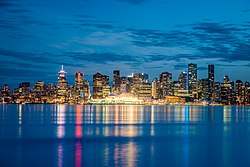Course:GEOG350/Chapters
| Guidelines | Create Your Book Chapter | Previous Book Chapters | Help and Resources |
| GEOG350 Urban Worlds Tackling Wicked Problems Through Design Thinking | |
|---|---|

| |
| Course Info | |
| Instructor: | Dr. Siobhán Wittig McPhee |
| Book Index | |
| Help and Resources | |
Creating Your Chapter
Here are some steps and resources to help you create your page and have it appear on the index for this portal on the bottom, so that it can be easily accessed by your peers and your instructor.
1. Login to the UBC Wiki
Click the CWL button on the top left of the page and login from there.
2. Create your User Page/Profile
Your user page is basically a profile page. Its purpose is to provide a space for you to let other UBC Wiki users know who you are and what your affiliation is with UBC. It can also be a space for testing and experimentation.
3. Create Your Chapter Page
We have made it easy for you to create your Chapter page right from here. Just add the title of your chapter to the box below and click on the create page button (note that you will need to be logged in to the UBC Wiki in order for this to work). On the edit screen that loads, add your name to the edit screen and hit SAVE at the bottom of the page. You can delete this later when you are ready to start writing your chapter.
4. Add Title and Headings
Some suggested headings to get you started are on the template page that we have created. To make it easy, you can simply copy and paste all headings and code from the template page to your page.
5. Add your chapter to the Index page
After you have completed your chapter, add your chapter to the project list below. For list of sections, take a look at the Book Outlines and Theme tab.
2026 Project List
| Link to Wiki Page |
|---|
| Rie's demo page |
Sharing Your Work
All wiki project pages are openly accessible on the Internet. If you would like to give permission for other people to use them (for example, by including them on the UBC Open Case Studies Site), the project template includes a green box that allows you to add your name(s) as author(s) of the resource and indicate if you'd like to share your work via a Creative Commons license . If you would like add a name for who or what project created the resource, add that info after the names parameters. If left blank, it will default to Course:GEOG350.
The following is all optional but if you’d like your name added to the page as author as well allowing other people to re-use it as a conservation resource, you can:
- Click on the edit tab to edit your page
- Then scroll to the bottom and click on the green box at the bottom of the page
- This will generate a little pop-up with an edit button. Push the edit button.
- In the names field, add your name if you would like to be credited as the author
- In the share field, add “yes” (must be lowercase) if you would like to allow other folks to be able to reuse your page, such as by including it on the UBC open case studies site at http://cases.open.ubc.ca/. Clicking yes adds a creative commons license to the page.